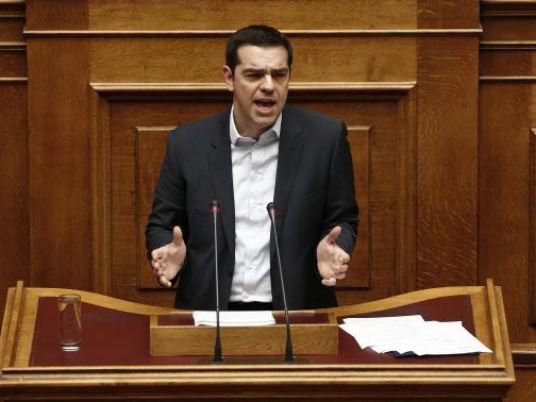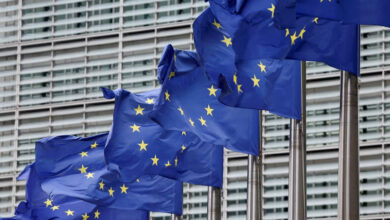
Greek Prime Minister Alexis Tsipras assured European Union creditors at late-night crisis talks in Brussels that his leftist-led coalition would present soon a full set of economic reforms in order to unlock cash to stave off bankruptcy.
After two months of mounting frustration on both sides since Tsipras was elected with a mandate to end years of austerity imposed by creditors' conditions, the three-hour meeting on the sidelines of an EU summit was requested by Tsipras to break an impasse that risks seeing Athens stumble out of the euro zone.
But while a joint statement by the EU institutions spoke of a "spirit of mutual trust" and Tsipras said he left feeling more optimistic, German Chancellor Angela Merkel stressed no money would be released before Athens implements budget measures and other reforms that it has so far been reluctant to consent to.
The risk of a continued standoff, exactly a month after Greece secured a last-gasp four-month extension of an EU bailout loan, was underlined in different descriptions by Tsipras and Merkel about what reforms Athens would need to launch.
"It is clear that Greece is not obliged to implement recessionary measures," the 40-year-old Greek premier told reporters, referring to previously agreed reforms. "Greece will submit its own structural reforms, which it will implement."
But Merkel, who faces mounting resistance in Europe's richest state to go on lending to keep an erratic partner in the common currency area, insisted that only the full completion of already approved measures would be acceptable to the creditors.
"The reference point is the agreement of Feb. 20," she said. "We have not changed one iota. You may have heard some of this before. But then not much has happened in the last few weeks."
Tsipras will make a much anticipated visit to Merkel in Berlin on Monday. EU officials said that if Greece did come up with a convincing plan to get its debts under control then euro zone finance ministers could meet soon to release at least some funds to help it meet pressing commitments in the coming weeks.
JOINT STATEMENT
The meeting involved Tsipras, Merkel, summit chairman Donald Tusk, European Commission President Jean-Claude Juncker, Jeroen Dijsselbloem, the chair of the Eurogroup of finance ministers, European Central Bank (ECB) President Mario Draghi and French President Francois Hollande. Juncker, Tusk and Dijsselbloem issued a joint statement on the outcome..
"We fully adhere to the agreement of the Eurogroup of Feb. 20. In the spirit of mutual trust, we are all committed to speed up the work and conclude it as fast as possible," it said. "The Greek authorities will have the ownership of the reforms and will present a full list of specific reforms in the next days."
Hollande said: "These reforms must be … compatible with Greece's commitments … There is no time to lose."
EU officials said the talks were conducted in a business-like manner – a contrast with some of the ructions over recent weeks that have seen increasingly bitter confrontation between Greek and German ministers. That has fuelled speculation that some creditor states might prefer to see Greece quit the euro.
Athens has been kept from bankruptcy by two bailouts since the global financial crisis, but now risks running out of money within weeks. On Thursday, Greek banks reported the largest deposit withdrawals in a month, a sign savers are worried about the outlook for the country's finances and institutions.
A person familiar with ECB thinking said Draghi would make clear the bank would not lift its limit on Greek short-term debt issuance, which Greece's Marxist finance minister has said is "asphyxiating" his country. "It's up to Greece to meet its commitments in order to get money from its creditors," said the person. "The ECB doesn’t do bridge finance."
Tsipras did not respond to questions about his country's funding problems, saying only before the meeting: "The EU needs more political initiatives that respect both democracy and its treaties so that we leave behind the crisis and move to growth."
A Greek official said Athens had enough cash to pay a final350 million euro instalment of a loan repayment to the International Monetary Fund on Friday.
"There remains a very tough way ahead," Merkel told the German parliament on Thursday. Greece must understand that international aid brought with it an obligation "to reform its budget and work towards one day no longer needing help".
Two EU/IMF bailouts totalling 240 billion euros (174 billion pounds) have kept Greece from bankruptcy since 2010 but its economy has shrunk by 25 percent, partly due to austerity measures imposed by the lenders. It risks running out of cash without more aid or permission to issue more short-term debt.


